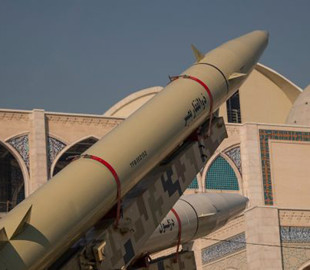
On the night of October 26, Israel retaliated against Iran for its missile attack on the 1st. As a result of the attack, the most important component of Iran's ballistic missile production program was disabled.
RBK-Ukraine reports this with reference to Axios.
According to three Israeli sources, the destruction of the equipment seriously damages Iran's ability to upgrade its missile arsenal. Among other things, it could deter Iran from further massive missile strikes on Israel.
The sources said Israel struck 12 “planetary mixers” used to produce solid fuel for long-range ballistic missiles, which constitute the main part of Iran's missile arsenal.
In turn, a high-ranking US official confirmed that the Israeli strike would paralyze Iran's missile production capabilities.
Axios, referring to Israeli sources, writes that the mixers that hit Israel are high-tech equipment that Iran cannot produce on its own and is forced to purchase from China. According to them, it could take at least a year to restore the mixers.
And although Iran still has a large stockpile of ballistic missiles, Israeli sources say that the fact that it is impossible to produce new ballistic missiles will limit Iran's ability to replenish its stockpile of ammunition. authorized persons. In particular, we are talking about the “Hezbollah” group and the Houthis.
200% Deposit Bonus up to €3,000 180% First Deposit Bonus up to $20,000In addition to the mixers, the Israeli attack affected four batteries of S-300 air defense systems, which were located in strategic locations and defended Tehran, as well as nuclear and energy facilities in Iran.
After the incident, the Iranian military said that the Israeli strike was dropped from Iraqi airspace. They added that several radar systems suffered minor damage and are currently being repaired.
The Iranian military did not mention any damage to missile or drone production facilities, emphasizing that the Iranian state reserves the right to respond.
At the same time, Israeli sources confirmed that the strikes were carried out from the airspace of Syria and Iraq, and some of them near the Iraqi border with Iran.
In addition, according to the publication's sources, the Israeli Air Force attacked a drone production plant and carried out a “symbolic” strike on a facility in the city of Parchin, which was used in the past for nuclear weapons research and development.
On the same day, Saturday, US President Joe Biden told reporters that the Israeli strike only hit military targets in Iran. He also hopes that this will put an end to the exchange of blows between Israel and Iran.
Meanwhile, the Qatari prime minister held a telephone conversation with the Iranian foreign minister, expressing serious concern about the escalation of the situation in the region following the Israeli strike.
“All parties in the region should exercise maximum restraint and avoid any further steps that could destabilize the region,” he said during the conversation.

